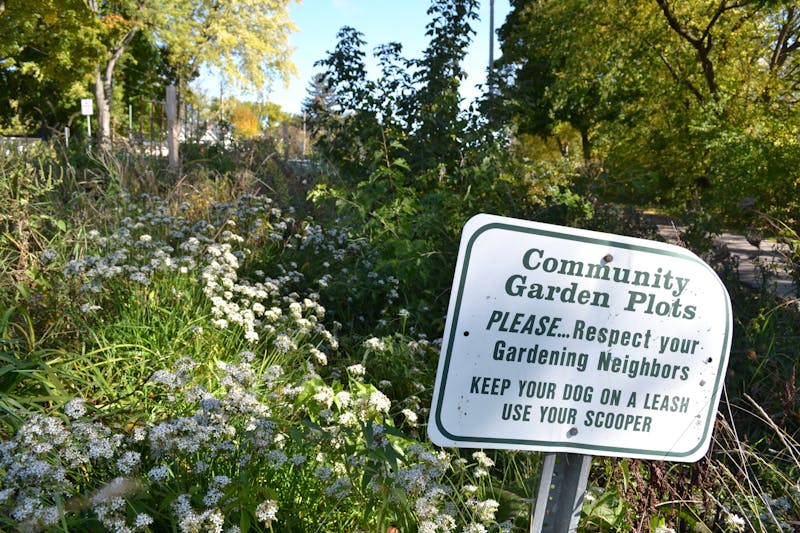Garden plots at the Atwood Community Gardens have a three-year waitlist due to the lack of urban garden space in Madison.


As the demand for urban garden space in Madison rises, the waitlist for renting a plot at the Atwood Community Gardens becomes longer. The supply for garden spaces is small, resulting in a three-year wait and limited accessibility for Madison-area residents.
The garden inhabits space along a bike path that runs from Waubesa Street to Jackson Street, parallel to St. Paul Avenue. The city of Madison leases the land to the Goodman Community Center, and the garden contains 115 rentable plots of land.
Dewayne Powell, Goodman Community Center vice president of financial and business services, told The Daily Cardinal Goodman’s initial reason for creating the Atwood Community Garden was to provide opportunities for urban gardening on Madison’s east side.
“The waitlist for Atwood Community Garden is so long because the supply for urban garden space is so small in Madison and the demand is so high,” Powell said. “Another factor that contributes to a long waitlist for the Atwood Community Garden is the sliding plot fee that is offered to community garden members.”
The sliding plot fee, which is based on income, is offered to community garden members to ensure plot fees are not a barrier to gardening at Atwood.
Powell told the Cardinal the garden’s goals are to make fresh produce accessible, promote healthier lifestyles, build a stronger sense of community, create opportunities for learning and generate positive environmental benefits.
The Atwood Community Gardens are run by a volunteer board of community gardeners managed through the Goodman Community Center’s volunteer board. The center is a private, nonprofit organization that offers programs for children and adults in the Madison community. The board schedules meetings, keeps up the garden, enforces garden standards and manages bills for the plots.
Ralph Johnson is a member of the Atwood Community Gardens leadership team and a volunteer gardener. He has rented a 648-square-foot garden plot for 25 years.
“My wife grew up on a dairy farm and she grew up gardening. I grew up in the city and knew absolutely nothing about it when I started out,” Johnson said. “But as time went on, we’ve grown more and more.”
Plot renters, including Johnson, use plots to provide fresh foods for their family, friends and community.
Johnson and his wife, Nancy, pay $115 annually for one of the bigger plots of land. They grow tomatoes, cucumbers, squash, beans and an assortment of greens to give to their friends, family and community.
“We have a little, short stand-up freezer that we fill with frozen stuff at the end of every season and eat it all winter. We have lots of good, fresh vegetables,” Johnson said. “Gardening does teach you how to eat seasonally and eat healthy.”

Atwood Community Gardens has benefits that provide service through specialized programs to serve both the gardens and the community.
The Teen Employment Program, or TEENworks, gives participants the opportunity to train in a variety of career pathways, according to the Goodman Community Center website. They include culinary arts, working with youth, coaching sports and working in the gardens. TEENworks participants are able to earn high school credit and an employability skills certificate for future employers.
Community garden members donate fresh foods to the Fritz Food Pantry, which provides groceries for over 200 households weekly. Vegetables, dairy products, eggs, meats and cheese are available to all families and individuals regardless of income level.
“The garden membership is a community within our community,” Powell said. “The garden members are very respectful [and] knowledgeable, and they care about Atwood Garden.”
For Johnson, keeping up his plot takes a lot of work. He spends most of his days harvesting his fruits and vegetables, hauling compost and laying soil.
“It's a passion,” Johnson said. “I love doing it, it's a lot of work but it’s worth it.”